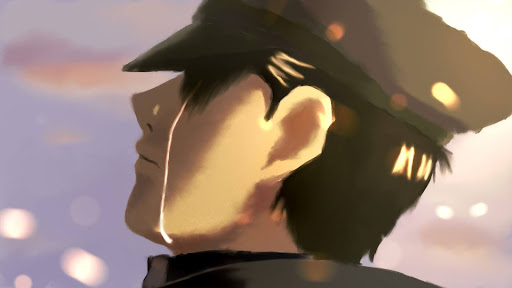The first time I heard it’s a terrible day for rain, I wasn’t ready for how hard it would hit me. I was in the middle of my first watch of Fullmetal Alchemist: Brotherhood, already reeling from the emotional rollercoaster, when episode 10 came along.
Maes Hughes’ funeral scene was heavy enough. The quiet, the overcast skies, the subdued music—it was already pressing on my chest. Then Roy Mustang spoke that line, and suddenly, it wasn’t just rain in the scene. It was grief disguised as weather.
It became one of those moments I never forgot. Not because it was loud or dramatic, but because it was understated—and in that understatement, it said more than a monologue ever could.
The Meaning Behind the Words
At first glance, it sounds like Mustang is simply talking about the weather. But in truth, he’s doing something far more personal—masking his tears behind the metaphor of rain.
By framing his grief as a casual observation, he shields himself from showing raw vulnerability. It’s a subtle form of emotional self-defense.
This dual meaning—literal and symbolic—is exactly why the line resonates so strongly with fans. It’s poetry in the most unassuming form.
Why the Scene Hits So Hard

Image source: Amino Apps
What makes this moment unforgettable isn’t over-the-top drama—it’s restraint.
We’re used to seeing characters openly sob when tragedy strikes. Mustang does the opposite. He stays composed, letting his words carry the weight instead of breaking down. That choice feels authentic because many of us do the same in real life.
By the time Mustang says the line, we’ve already absorbed the shock of Hughes’ death. His calm delivery gives viewers space to sit with that loss instead of overwhelming us with a big, showy reaction
How Mustang’s Character Shapes the Moment
Roy Mustang character is known for his confidence and control. His flame alchemy is a signature strength, making him one of the most formidable characters in the series.
Yet rain is his Achilles’ heel—it literally renders him powerless. So in this scene, the rain represents more than a tearful sky; it’s his actual physical weakness.
The symbolism is layered: Mustang is drained of his power and emotionally shaken, a rare combination for a character usually in command. That vulnerability is what makes the line linger in your mind.
How the Line Became an Anime Staple
Some lines in anime fade over time, but this one didn’t. Fans held onto it.
You’ll see it quoted in Reddit threads, woven into TikTok edits, and recreated in fan art across DeviantArt and Instagram. It’s more than a quote—it’s a quiet marker of shared understanding among Fullmetal Alchemist fans. When you hear it, you instantly know the weight it carries.
Why It Works Outside the Anime

Image source: BorkMork – Tumblr
Even if someone hasn’t seen Fullmetal Alchemist, the line works as a piece of everyday language.
Get bad news? Endure a rough day at work? Saying, “It’s a terrible day for rain,” is a way to acknowledge pain without spelling it out.
For anime fans, it’s almost like an inside joke with heart. It’s shorthand for, I’m not okay, but I don’t need to say it outright.
Subtle Storytelling at Its Best
Grand gestures have their place, but subtlety often leaves the deepest mark. This scene is a masterclass in that idea.
It doesn’t tell you exactly how to feel—it trusts you to catch the meaning. That’s why it stays with you long after the episode ends.
It’s also a testament to how character writing matters. Without Mustang’s established personality and history, the line wouldn’t land the same way.
Using “It’s a Terrible Day for Rain” in Real Life
If you’re going to borrow the line, timing is everything. It works best when you want to acknowledge hardship without making a big emotional scene.
On social media, it pairs well with moody rain photos or empty street shots. In conversation, it can gently signal that you’re having a hard time without inviting a full-on discussion—unless you want to.
The beauty lies in its subtle delivery. Let the listener or reader fill in the emotional blanks.
A Closer Look at Episode 10

Image source: SoundCloud
The moment happens shortly after Hughes’ funeral. Mustang stands in the rain, speaking with his subordinates. Someone comments on the weather, and he responds with the now-famous line.
The scene’s power is in its direction. There’s no dramatic score swelling in the background, no exaggerated tears. Just Mustang, the rain, and a brief pause long enough for us to understand.
Why This Isn’t Just Another Weather Metaphor
Sure, rain as a symbol for tears is nothing new in storytelling. But in Fullmetal Alchemist, it feels organic rather than forced.
That’s because it aligns perfectly with Mustang’s personality and known weakness. The line isn’t a piece of pretty writing inserted for effect—it’s something that feels true to the character in that exact moment.
Making the Phrase Your Own

Image source: Tenthsky (Youtube)
Want to use this line in your own life? Treat it like a rare gem—something you don’t toss into every conversation.
Save it for moments that match its tone. In captions, pair it with imagery that reflects quiet reflection. In person, use it when words feel too direct or heavy.
The strength of the phrase comes from its minimalism. Too much explanation, and the magic fades.
FAQs About “It’s a Terrible Day for Rain”
Where is the line from?
It’s from Fullmetal Alchemist: Brotherhood, episode 10. Roy Mustang says it during Maes Hughes’ funeral.
Why is it so emotional?
Because it’s layered—on the surface it’s about rain, but underneath it’s about grief and the act of hiding it.
Does rain hold special meaning for Mustang?
Yes. It nullifies his flame alchemy, making it a symbol of both physical and emotional vulnerability.
Has it become a meme?
Absolutely. It’s widely used in anime communities through GIFs, edits, and tribute art.
When Less Really Is More
It’s a terrible day for rain is proof that some of the most powerful lines aren’t loud or flashy. They’re quiet, they’re subtle, and they leave space for us to feel the weight ourselves.
For me, it’s a phrase that comes back during life’s heavier moments. It’s not just an anime reference—it’s a gentle way to acknowledge hurt without having to say, I’m hurting.
And maybe that’s why, all these years later, it still feels just as impactful as the day I first heard it.
Feature Image source: Reddit




